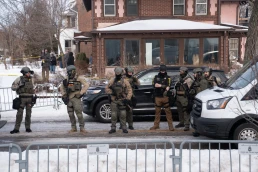While the Houthis are being armed by Iran, the Saudis and Emiratis are being equipped by Western powers, including the US, Britain and France.
By Thalif Deen, InDepthNews
The Saudi-led airstrikes in Yemen on January 21, which killed at least 70 civilians, has shifted the focus once again to the festering seven-year-old conflict in the Middle East, which the UN has described as “the world’s worst humanitarian disaster”.
The disproportionate retaliation was a response to a drone attack by the Houthis based in Yemen, which killed about three in Abu Dhabi, the capital of the United Arab Emirates (UAE), an integral partner of the Saudi military coalition.
The ongoing conflict has not only claimed the lives of more than 100,000 people since 2015—but also generated accusations of “war crimes” against the warring parties by international human rights organizations.
While the Houthis are being armed by Iran, the Saudis and Emiratis are being equipped by Western powers, including the US, Britain and France.

The Saudi military arsenal includes F-15 fighter planes, Apache helicopters, Stinger and Hellfire surface to air (SAM) missiles, and multiple rocket launch systems (originating from the US), Tornado fighter bombers, Bae Hawk advanced jet trainers and Westland combat helicopters (from the UK) and Aerospatiale helicopters and air defence systems (from France).
The US weapons systems with the UAE forces include F-16 fighter planes, F-35 Stealth jet fighters, Blackhawk helicopters and Sidewinder and Maverick missiles while UK’s arms supplies include Typhoon and Tornado fighter bombers and cluster munitions. The UAE is also equipped with French-made Mirage-2000 jet fighters, perhaps upgraded to the Mirage 2000-9 version.
All of these weapons—and more—have been used to bomb civilians in Yemen in the ongoing conflict there.
The killings are mostly due to erratic airstrikes on weddings, funerals, private homes, villages and schools. Additionally, over 130,000 have died resulting largely from war-related shortages of food and medical care.
Pieter Wezeman, a Senior Researcher at the Stockholm International Peace Research Institute (SIPRI), told IDN the US and UK have been the largest arms suppliers to Saudi Arabia over the past 10 years and the US and France the most important arms suppliers to the UAE.
In 2021, he pointed out, the Biden administration in the US pledged it will be more restrictive in its arms sales, especially to Saudi Arabia.
“However, what exactly that means remains somewhat unclear. It appears that the supply of guided bombs to Saudi Arabia has been curtailed in 2021, but the details remain uncertain. Deliveries of other equipment, in particular combat aircraft, continued in 2021.”
In Europe, a few states, for example, Germany, Sweden and the Netherlands, have significantly restricted their arms sales to Saudi Arabia, due to concerns over human rights in the country and Saudi Arabia’s military actions in Yemen.
Other countries have continued arms deliveries to Saudi Arabia, while the UAE has signed new arms contracts, in particular with France and the UK.
A good example, he said, is the agreement between France and the UAE for the sale of 80 new Rafale combat aircraft which are to replace older French Mirage-2000 aircraft which the UAE has used in Yemen.
Norman Solomon, Executive Director, Institute for Public Accuracy and Director, RootsAction.org posed the question: “what can be said after the president of the United States decides to sell $650 million worth of weaponry to Saudi Arabia and then the U.S. Senate votes to approve the sale?”
Those events late last year, he told IDN, underscore “Washington’s active complicity with the barbaric Saudi-led war on Yemen”, which is not only a historic fact but also a current reality.
And such events provide context for how the latest atrocities against people in Yemen have been made possible, said Solomon.
“Like Presidents Barack Obama and Donald Trump before him, Joe Biden has opted to stay cosy with murderous Saudi oligarchs rather than match American rhetoric about ‘human rights’ with meaningful policies to promote them.”
“And the 67 per cent of the senators who voted to approve the latest arms sales have followed in the footsteps of a long line of US Congressional lawmakers who’ve preferred to grease the wheels of war machines rather than stand up for human decency,” he noted.
“The world is choking on facile words poisoned by depraved and deadly deeds from powerful officials. As the United States faces an internal threat to democracy, Biden is making nice with Saudi royals who could hardly be more undemocratic.”
The current alliance between the White House and the House of Saud is the continuation of decades of chummy relations between two heavily-armed states willing to bring about massive carnage far beyond their borders while pursuing geopolitical goals, said Solomon.
The latest atrocity is a consequence of a long-running horrendous war effort fuelled by the de facto partnership between Washington and Riyadh—largely based on oil and shared hostility toward Iran, he argued.
“Every day that the Saudi-led war on Yemen continues is a day when major responsibility for the widespread bloodshed and suffering is on the doorstep at 1600 Pennsylvania Avenue in Washington,” declared Solomon.
Richard J. Ponzio, Director, Global Governance, Justice & Security Program and Senior Fellow at the Washington-based Stimson Center, told IDN: “Especially given the latest devastating loss of civilian life—illustrating yet again the futility of a protracted military conflict in Yemen, it is incumbent upon the Security Council to lend its full political backing to Secretary-General António Guterres’ calls for ‘prompt, effective and transparent investigations into Friday’s (January 21) bombings to ensure accountability and facilitate de-escalation”.
Importantly, he argued, the Security Council’s most powerful members must bring greater political pressure to bear on all parties to Yemen’s long war to work with the Secretary-General’s Special Envoy Hans Grundberg to reach a negotiated settlement. “Only by advancing a comprehensive political process do the Yemeni people stand a chance of building something resembling a just and durable peace.”
Meanwhile, UN Secretary-General António Guterres has condemned the airstrikes against a detention centre in Saada city, Yemen.
He said initial reports indicate at least 60 deaths and over 100 injured among the inmates. Further airstrikes have been reported elsewhere in Yemen, also with reports of deaths and injuries among civilians, including children. An airstrike on telecommunications facilities in Hudaydah has also significantly disrupted vital internet services across much of the country.
Guterres reminded all warring parties that attacks directed against civilians and civilian infrastructure are prohibited by international humanitarian law. He further reminded all parties of their obligations under international humanitarian law to ensure that civilians are protected against the dangers arising from military operations, adhering to the principles of proportionality, distinction and precaution.
The Secretary-General also called for “prompt, effective and transparent investigations into these incidents to ensure accountability”.
He called for urgent de-escalation of the situation and urged the parties to engage with his Special Envoy to advance the political process to reach a negotiated settlement to end the conflict. Recalling the severe humanitarian crisis in Yemen, he urged donors and all other stakeholders to enable humanitarian relief efforts with adequate funding, access and other support.
In a joint statement released last week, a coalition of eight international humanitarian organizations said they were horrified by the news that more than 70 people, including migrants, women and children, have been killed in Hodeida and Sada on January 21 morning, in a blatant disregard for civilian lives.
In Sada, a holding facility for migrants was attacked overnight, among other buildings, killing 67 people and injuring 108, according to initial reports.
Initial hospital reports suggest more than 100 people, mostly migrants, were also injured, and the true numbers might be higher as aid workers and paramedics clear the rubble and verify the information.
In Hodeida, three children were killed while playing on a football field, and at least five adults were injured. Airstrikes have also damaged a telecommunication centre downing internet connection across the country and disrupting phone lines in several governorates.
The escalation comes after the Human Rights Council voted to end the mandate of the Group of Eminent Experts, the only international and independent body tasked with investigating the examination of all alleged violations and abuses of international human rights and other appropriate and applicable fields of international law committed by all parties to the conflict, the coalition added.
These airstrikes come after three medical facilities and one water reservoir was attacked this week alone, according to the statement.
Aid agencies operating in Yemen call on parties to the conflict to respect international humanitarian law and international human rights law and protect civilians and civilian infrastructure during hostilities.
“We also call on the international community to ensure accountability for all violations and abuses against children and civilians, through the urgent reinstatement of an international independent monitoring and reporting mechanism on Yemen and the establishment of an adequately resourced and sufficiently staffed international investigative mechanism for the country,” the coalition said.
The eight signatories include Action Contre la Faim, Danish Refugee Council, Handicap International—Humanity & Inclusion, INTERSOS, Norwegian Refugee Council, Oxfam, Saferworld and Save the Children.
Thalif Deen is a former Director, Foreign Military Markets at Defense Marketing Services; Senior Defense Analyst at Forecast International; and military editor Middle East/Africa at Jane’s Information Group in the US. [IDN-InDepthNews — 25 January 2021]
Recent Posts
For Trump and Rubio, Colonizing Cuba Is Not About Freedom—It’s About Their Own Egos
February 15, 2026
Take Action Now For Trump, regime change in Cuba will cement his legacy. For Rubio, it will mark the culmination of his childhood dream. In their…
Trump’s Concentration Camp Build-Out Includes Nearly $40 Billion for Warehouse Conversions
February 14, 2026
Take Action Now “Germany’s concentration camps didn’t start as instruments of mass murder, and neither have ours,” wrote talk show host Thom…
Everyone Is Allowed To Protest
February 13, 2026
Take Action Now Tied up with the apparently very longstanding tradition of claiming that all opponents of atrocities are purely engaged in what has…
Abolition Is Still The Only Way Out Of This
February 13, 2026
Take Action Now Forget the useless so-called “reforms” to ICE and policing currently on offer. We need much more fundamental change.By Andrea J.…




